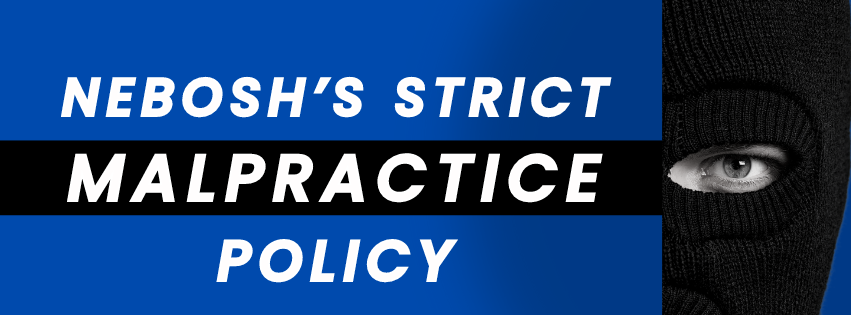The national Examination Board in Occupational Safety and Health (NEBOSH) is a globally recognized body offering qualifications in health, safety, and environmental management. To maintain the integrity and credibility of its qualifications, NEBOSH has stringent policies on malpractice. Understanding these policies is crucial for both candidates and course providers to ensure fair and honest assessment processes.
What is Malpractice?
Malpractice refers to any act or practice that breaches NEBOSH's regulations and can compromise the integrity, reliability, and fairness of the examination and assessment process. It includes, but is not limited to, cheating, plagiarism, and any form of dishonest behavior during exams.
Key Elements of NEBOSH Malpractice Policies
- Cheating: This includes copying from another candidate, using unauthorized materials, or receiving assistance during an examination.
- Plagiarism: Submitting work that is not your own or without proper acknowledgment of sources.
- Collusion: Working with others to produce work that is submitted as individual work.
- Impersonation: Pretending to be another candidate or arranging for someone else to take the exam on your behalf.
- Fabrication of Information: Making up data, results, or other content in coursework or assessments.
- Bribery: Offering or accepting bribes to gain an unfair advantage in the assessment process.
Consequences of Malpractice
Engaging in malpractice can have severe Consequences, including:
- Disqualification from the examination.
- Voidance of the qualification.
- Reporting to relevant professional bodies.
- Legal action in severe cases.
NEBOSH takes these issues seriously to ensure the value of its qualifications is upheld and trusted by employers and regulatory bodies worldwide.
Good Practices to Avoid Malpractice
- Adhere to Guidelines: Always follow NEBOSH's assessment guidelines and instructions.
- Original Work: Ensure all submitted work is your own and properly reference any sources used.
- Preparation: Thoroughly prepare for examinations to avoid the temptation of cheating.
- Integrity: Maintain personal and professional integrity by refusing to engage in dishonest behaviors.
- Seek Clarification: If unsure about what constitutes malpractice, seek clarification from your tutor or course provider.
- Use Authorized Resources:Only use resources and materials that are permitted by NEBOSH during your examinations.
- Report Malpractice: If you become aware of any malpractice, report it to NEBOSH or your course provider.
Bad Practices Leading to Malpractice
- Copying: Looking at another candidate’s work during an exam or copying their answers.
- Using Unauthorized Materials: Bringing unauthorized notes, books, or electronic devices into the examination room.
- Sharing Answers: Discussing or sharing answers with other candidates during or after the exam.
- Ignoring Instructions: Disregarding instructions from exam invigilators or course providers regarding the examination process.
- Falsifying Information: Submitting false or fabricated data or results in your assessments.
- Collusion: Collaborating with others on assignments that are supposed to be completed individually.
Conclusion
Maintaining the integrity of NEBOSH examinations is crucial for the credibility of the qualifications awarded. Understanding and adhering to NEBOSH malpractice policies is essential for all candidates and course providers. By practicing honesty, integrity, and following the guidelines, candidates can ensure their qualifications are respected and valued in the professional world. Avoiding bad practices and embracing good practices not only helps in achieving genuine success but also upholds the reputation of NEBOSH certifications globally.
